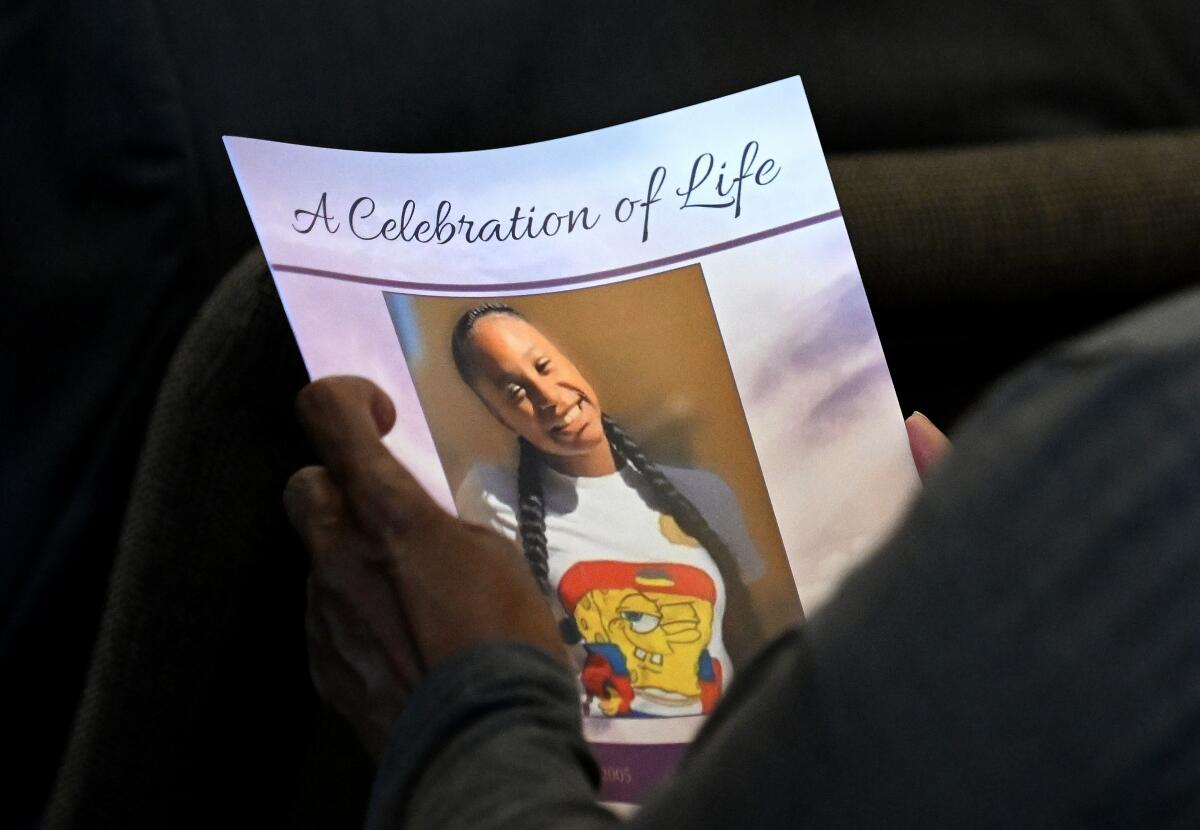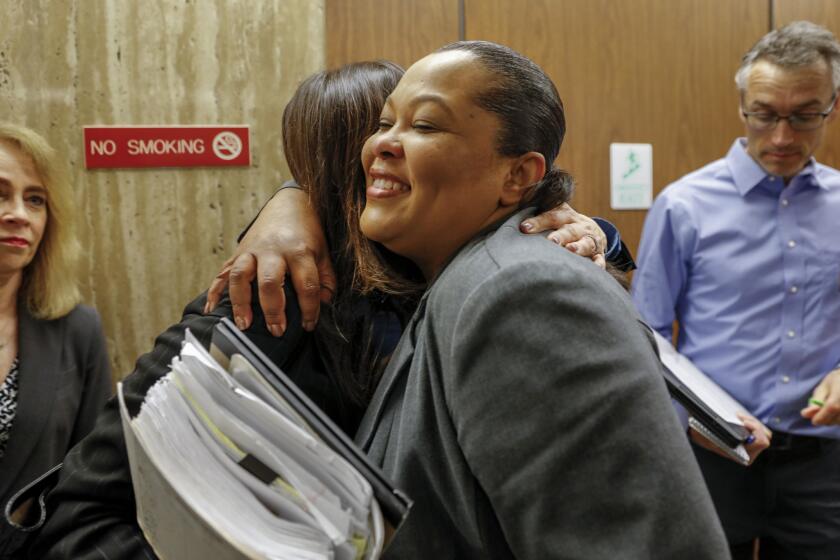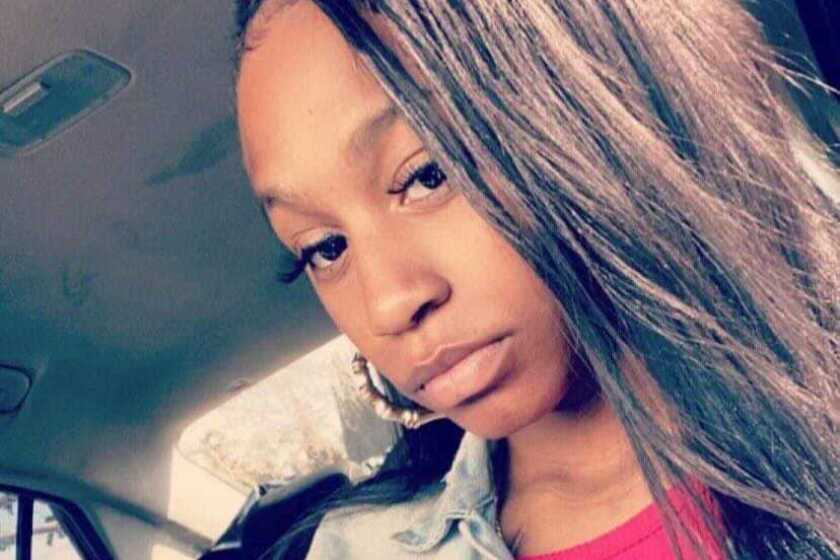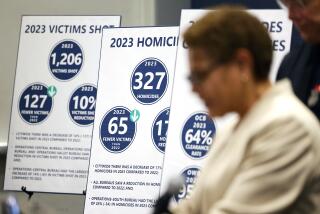Violence against Black women in L.A. remains high, even as serious crime drops

- Share via
Even as the rate of serious crime in Los Angeles trends downward, Black women and girls remain at higher risk of victimization than any other demographic, according to a report by the city’s civil rights department.
At the same time, the report said, their deaths and disappearances receive far less attention from law enforcement and the news media than other races.
The findings reflect the additional burdens placed on Black women, who are forced to overcome “financial instability, income inequality, housing insecurity, and a myriad of other potential social safety risks,” even as they navigate the disproportionate impact of the pandemic on communities of color, according to the report.
“Black women experience a unique position of precarity as a result of decades of discrimination, grounded both in racism and sexism,” the report said.
Councilmembers Curren Price and Marqueece Harris-Dawson commissioned the study last year after the killing of Tioni Theus, a 16-year-old Black girl who was fatally shot and left alongside a South Los Angeles freeway.
Citing LAPD statistics, the report found that while Black women make up about 4.3% of the city’s population, they often account for 25% to 33% of its victims of violence.
Over the period from January 2011 through August 2022, 481 women were killed in L.A. Nearly a third, or 158, of those victims were Black, and the deaths were concentrated in poorer neighborhoods, according to the report. Many were killed in acts of intimate partner violence. The number of Latina women murdered jumped by more than 38% in that span, but Black women were “statistically the most overrepresented” when compared to their share of the population, the report said.
Black women were the victims in about a third of the 62,264 aggravated assaults with female victims reported to the LAPD during the period. They were nearly two times more likely to be seriously injured in an assault than women of other races.
“Basically, when things go wrong, women of color, particularly Black women, get the worst of it,” said Capri Maddox, executive director of the city’s civil rights department, whose full name is the civil + human rights and equity department. “This is just another example of how we are ‘othered.’ I mean, we deal with biases in the workplace, biases in medicine and even biases in how to protect our personal safety.”
Racial disparities in violent crime rates are nothing new in L.A. Statistics about disproportionate bloodshed in Black and Latino neighborhoods have historically been wielded by civic and police leaders to push more aggressive policing there.
But after the social tumult of the past few years, the report reflects a change in political discourse over the role of police and what public safety will look like in the future. Its authors argue that the city should increase funding to community groups working to address these disparities, which drive crime, and to explore “alternative community responses to domestic violence that do not require calling the police,” said the report, which was presented to the City Council’s civil rights committee on Friday.
The report recommended investing in prevention strategies such as youth development and empowerment, educating healthcare professionals on how to spot victims of abuse, and victim-centered responses to violence that don’t “retraumatize the survivor.”
The report urged the LAPD to revisit some of its policies for handling domestic violence and to strengthen its ties with community organizations that provide crisis intervention and violence prevention services.
The findings were hardly unexpected, said Marsha Mitchell, communications director for the nonprofit advocacy group Community Coalition.
“There is a history of non-action regarding violence against [B]lack women,” Mitchell said in an email. She noted that indifference by police and the news media to Black grief dates at least as far back as the so-called Grim Sleeper serial murders, when the LAPD kept the slayings quiet despite suspicions that a killer was stalking young Black women.
Nearly 30 years after the first victim was found sprawled in a South Los Angeles alley, the man authorities believed was the “Grim Sleeper” serial killer was found guilty Thursday of murdering nine women and a teenage girl in a series of slayings that took decades to connect.
For Bernita Walker, the lack of empathy toward Black women is no surprise in a country that has been slow to come to terms with the racism embedded deeply in its history.
“We know that there is a problem with Black women’s lives not being covered extensively as they should be” by the news media, said Walker, who runs Project: PeaceMakers Inc., a domestic violence organization based in South L.A. Sometimes the voices of Black women who find themselves in cycles of abuse are ignored until it’s too late, because people “feel that we’re overexaggerating” — and police don’t always treat these cases with the same urgency, she said.
The report offers a glimmer of optimism — the LAPD solved 77 of 81 homicides of Black women between 2016 and 2022. But it cast doubt on the accuracy of LAPD statistics due to reporting inconsistencies and also pointed out that many crimes go unreported, particularly in communities of color. Fractured trust in law enforcement remains a key issue in some Black and Latino communities.
Theus was last seen on Jan. 7, 2022. She had told a family member that she was going to a party with a friend.
Because her body was discovered on an onramp to the 110 Freeway, the California Highway Patrol is investigating the case.
The report said that news articles, which started as a trickle, overemphasized the possibility that “theft and prostitution” could have played a role in her death.
Such “victim-blaming” language and framing “normalizes” violent acts against other Black women, the report said.
Longtime community organizer Najee Ali said the report “only confirmed what Black activists have known for decades.”
The fatal stabbing of a young white woman named Brianna Kupfer around the same time made headlines around the country. According to Ali, news coverage of Theus’ death only picked up after he and her family began publicly calling out the “hypocrisy.”
The lack of attention being paid to the killing of troubled Black teen Tioni Theus is yet another reminder of who is valued in America and who is not.
After that, city and county leaders pledged tens of thousands of dollars in reward money for information leading to an arrest.
Nafeesah Kincy, Theus’ cousin, said she is glad that Theus is still on people’s minds but that the loss has been hard.
“Here I am, a Black woman who has to go out every day and cope and deal with all this depression, knowing that my life don’t matter,” Kincy said. “Tioni was a beautiful soul, and she didn’t deserve this, and I just want her name to stay out there and stay alive, and I just hope that it being reported on, it jars someone’s memory.”
Another cousin, Solona Theus, said that people should stop judging a slain teenager who was dealing with her mother’s death.
“A lot of people wanna speak and say, ‘Oh well, she was online, or she was dressed this way, or she was out there in the streets,’” Solona Theus said. “But she was a human being. A lot of these girls are just human beings.”
More to Read
Sign up for Essential California
The most important California stories and recommendations in your inbox every morning.
You may occasionally receive promotional content from the Los Angeles Times.













